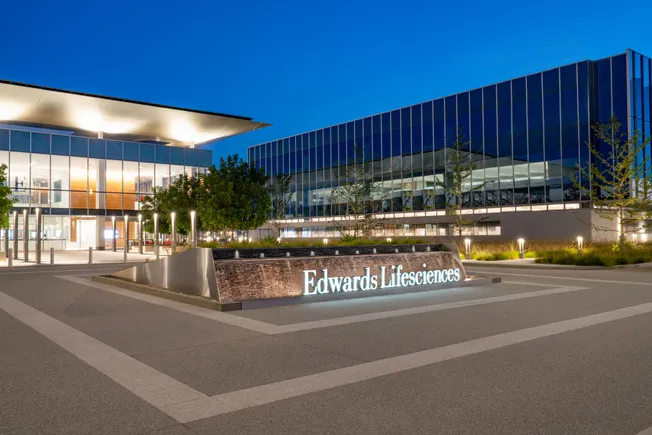By the numbers
Q2 sales: $1.39 billion
Roughly 7% year-over-year growth
Net income: $366.3 million
About 19% year-over-year growth
Edwards Lifesciences said Wednesday it will pay about $1.2 billion to acquire a pair of cardiac device companies that will expand its lineup of structural heart offerings.
The acquisitions come as Edwards posted weaker-than-expected second-quarter sales growth in transcatheter aortic valve replacement (TAVR), its largest business. The slowdown pressured Edwards’ shares, which were down nearly 25% in Thursday morning trading on the New York Stock Exchange.
The acquisitions follow two deals involving mitral valve technologies it struck earlier this month.
In the latest moves, Edwards said it agreed to acquire JenaValve Technology, which is developing the first treatment for aortic regurgitation. While TAVR treats aortic stenosis, a narrowing of the valve due to calcium buildup, JenaValve is targeting aortic regurgitation, when the valve does not close properly, causing blood to leak.
Edwards anticipates Food and Drug Administration approval for the JenaValve Trilogy heart valve system in late 2025.
The company also exercised an option to acquire Endotronix, maker of an implantable pulmonary artery pressure sensor for heart failure, a new therapeutic area for the company.
Edwards expects to pay an additional sum of up to $445 million if certain milestones are reached, the company said in a securities filing. The investments represent long-term growth opportunities in areas of unmet need, Edwards said.
“These two acquisitions would appear to complement Edwards’ structural heart portfolio and strengthen [its] presence in the aortic disease and heart failure treatment niche markets,” Stifel analyst Rick Wise said in a note to clients.
In mid-July, Edwards said it exercised an option to buy Innovalve Bio Medical, developer of a transcatheter mitral valve replacement device, for about $300 million. Separately, Edwards agreed to pay 15 million euros for a stake in Affluent Medical, gaining an option to buy its mitral ring subsidiary and a global license for biomimetic mitral valve replacement technology.
Q2 slowdown
Edwards is laying the foundation for growth from new treatments as it faces a slowdown in its core TAVR business. Second-quarter TAVR sales of $1 billion, representing year-over-year growth of 5%, fell short of expectations.
“This did come as a surprise,” CFO Scott Ullem told analysts on an earnings call. But hospitals’ structural heart teams have been focused on ramping up new transcatheter mitral and tricuspid therapies (TMTT), which in hindsight has affected TAVR procedure volumes, Ullem explained.
“We’re very confident this isn’t some slowdown because there’s a lack of patients,” said Ullem. “It’s just a matter of workflow right now.”
Edwards executives stressed that the company’s competitive position in TAVR hasn’t meaningfully changed, and they expect the workflow logjam to resolve itself.
However, that could take some time, said BTIG analyst Marie Thibault.
“In our view, this is a multi-quarter challenge that does not have an easy fix,” Thibault wrote in a report.
William Blair analyst Margaret Kaczor Andrew noted that many of the same interventional cardiologists and large TAVR centers are early adopters of Edwards’ TMTT devices, such as Pascal and Evoque. “While a headwind for TAVR, we believe this is validating the procedural demand within TMTT,” the analyst wrote in a report.
The company’s TMTT business, including the Pascal repair system and Evoque tricuspid replacement system, posted sales of $83 million in the quarter, up 75% year over year.
Edwards, which is selling its critical care unit to BD for $4.2 billion, expects that transaction to close late in the third quarter.

